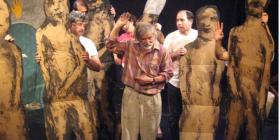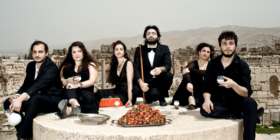Cultural Thought and Practice in Morocco

The itinerant workshop Thought and Practice (Pensée et Pratique P&P), on the initiative of the René Seydoux Foundation, was held from the 22nd to the 24th January 2015 in Casablanca with the aim of analyzing the conditions of cultural life in Morocco from a Mediterranean perspective.
Thought and Practice was launched in 2012 with the René Seydoux Foundation's initiative. It is an informal and itinerant group created by people engaged in international action between the two sides of the Mediterranean such as Héla Ammar, visual artist and academic from Tunis; Isaías Barreñada, political scientist and member of the EuroMed Human Rights Network; Roland Biache from SolidaritéLaïque; Claire Duport, researcher in sociology and urban anthropology at the Aix-Marseille University and member of Transverscité; Ahmed el Attar, Egyptian director; Fanny Bouquerel from the Amunì association in Palermo, specialist of cultural policies in the Mediterranean; Elizabeth Grech, translator and Giovanna Tanzarella from the Renée Seydoux Foundation.
The idea came to mind when the political upheavals that shook many areas in the southern shore made the cultural actors afraid of being left in the dark by the rapid pace of change. In this delicate moment, they wanted to maintain contact to be able to think together as a group. Their aim was not to make a direct political and cultural advocacy, but to contribute through their analyses and empirical knowledge. Their ambition, as a committed group in a variable geographic area, was to produce a relevant and well-founded discourse, an argumentation that emphasises their needs and priorities.
The first meetings of the group were held in the Euromed Centre in Marseille, Beirut, Cairo and Paris. A last meeting was held in Casablanca from the 22nd to the 24th January 2015 in the presence of some of the founding members of P&P and Moroccan and international cultural players including Claudine Dussollier, geographer and head of cultural projects and multimedia at Transvercité; André Akusta, consultant of Noria-DP in Marseille; Hassan El Geretly, director of the El Warsha Company; Limam Kane, music producer, ZAZA Productions in Nouakchott; DrissKsikes, Moroccan playwright and journalist; Marc Mercier, filmmaker and director of Festival Instants Vidéo Marseille; Gerarda Ventura of Con.Me. Association, EuroMed NGO Platform in Rome; SamyAbdelguerfi independent Algerian journalist, member of Arterial Network and other participants.
During their discussion in Casablanca, these players questioned the conditions conducive to their cultural, educational and artistic work. They had been invited to make a theoretical effort to define indicators in advance, but also to share their practical experiences in the field of culture, including some success stories that have unfolded in spite of adverse conditions.
However, this commitment to develop a grid of indicators caused a reaction of distrust within the group. Some thought that the indicators are the responsibility of States; other perceived it as an attempt to confine reality in fixed settings.
The discussion also showed that the cultural players face similar conditions in their respective countries, and in more or less favourable environments. They are universally driven by the same desire for change that has increased over the long term, much beyond the short time of the revolutionary events.
They have all faced, to varying degrees, constraints and a more or less hostile environment, hence the feeling that it would have been better to reverse the process, and to first look for gaps and shortcomings for initiating a political process (advocacy and argumentation) placing the artistic and cultural projects in the centre of the debate, so that they become levers for social transformation.
During discussions, it also emerged that cultural operators and artists have a lot in common with other sectors of independent civil society (human rights advocates, militants of economic and social rights, actors involved in development). Their organisations indeed work in similar conditions. They are all also experiencing the same difficulties in the "dialogue" with the authorities, regarding the issues of governance and non-participation in the development of cultural and social policies.
Finally, some have expressed the wish that the prospect of working on the enabling environment would not be abandoned. In the light of the work produced by the Étatsgénéraux de la Culture au Maroc, the idea of a grid could be maintained because it could help shed light on procedures and models.
In the end, accurate and successful experiences of the Moroccan cultural field were questioned in the presence of their initiators: the experience of the theatre company Dabateatr (Rabat) www.dabateatr.com that managed to create a civic space for discussion and confrontation in the Moroccan cultural landscape through its monthly theatrical activities "DabateatrCitoyen" and that of the Association Racine www.racines.ma that, for three years, in collaboration with public institutions, civil society and cultural players, led a diagnosis and inventory of the current state of art and culture in Morocco. In this way recommendations for the establishment of a Moroccan cultural policy could be established.
To better understand the functioning of the independent cultural sector in Morocco, the group was welcomed by Hassan Darsi at the workshop of the Source du Lion, by Nisrine Chiba at the EspaceDarja and by Mohamed el Hassouni at the Théâtrenomade located at the slaughterhouses. The discussion focused on the operation of these places, the difficulties encountered and how these positive experiences become part of the social fabric and the neighbourhoods where they are based.
Besides these Moroccan experiences, a presentation was madeabout the activities of the association Carovana in Cagliari, Sardinia,managed by OrnellaD'Agostino. For over 15 years, this choreographer led an intellectual and political study online to develop an interdisciplinary approach to body and identity in the Mediterranean area.
An evaluation meeting of the encounter was held after these exchanges and a guideline was drawn for the coming months:
- to work on content, language and the argumentation of the group, which would be useful for future battles;
- to organize a next step in Greece;
- to make exchanges more continuous by means of the blog that needs rethinking: a call for contributions was launched by the group P&P for writing short, simple texts that can nourish and deepen thoughts, connections and exchanges.
Content produced in collaboration with Babelmed







